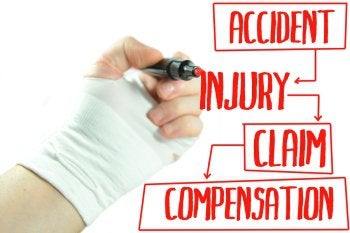-
Actions to Take if You Are Injured on the Job
You work hard to ensure that your employer succeeds. If you suffer an injury while performing your normal job duties, you deserve to be taken care of while you recover. Many Californians who are injured on the job are entitled to workers’ compensation—if you are denied workers’ compensation, or if you believe that your injuries were caused by negligence, consider hiring a Tracy lawyer .

Seek Medical Attention
Depending on the severity of your injury, you may choose to seek medical attention immediately or at your earliest convenience. Regardless, it’s important to visit a doctor soon after the incident, as waiting too long could cause your injury to get much worse. During the examination, be sure to tell your doctor that you suffered your injury at work.
Notify Your Employer
Notify your employer of the incident as soon as you are able. If you wait more than 30 days after the date of the incident, you may forfeit your right to receive workers’ compensation. Some injuries occur gradually—if this is the case, inform your employer as soon as you suspect a job-related injury.
Analyze the Incident
If all goes well, you should begin receiving your workers’ compensation benefits within a few weeks. However, you might find that this compensation isn’t enough. Consider analyzing the circumstances surrounding your injury—if you detect any evidence of negligence, you might file a personal injury claim against your employer.
Hire an Attorney
There are a lot of potential complications surrounding work injuries . For example, your employer’s insurance company may deny you benefits based on something you said. If you are subjected to hard questioning, or if something seems amiss with your compensation benefits, consider hiring an attorney. A skilled lawyer can also help you investigate the circumstances of your injury and help you determine whether to pursue a personal injury claim.
““
-
Creating an Estate Planning Checklist
It’s important to make sure your loved ones are taken care of in case something happens to you. Careful estate planning can ensure that your wishes are carried out when you are unable to carry them out yourself.
In this video, an estate planning expert outlines a checklist of important actions to take while you are still of sound body and mind. First, it’s important to make sure your own health is taken care of—you can do this by signing an advance directive, or medical power of attorney. An advance directive outlines your specific healthcare wishes in the event of an accident or illness that leaves you incapacitated. Next, it’s important to have a financial power of attorney or living trust in place to ensure that your finances are properly distributed in the event of your death. A Tracy estate planning attorney can help with all these matters.
““
-
Factors to Consider When Hiring a Lawyer
A skilled lawyer can help you handle a number of complicated aspects of life. Whether you’re looking to plan your estate or hold another individual legally responsible for your injuries, it’s a good idea to hire an attorney. However, not just any lawyer will do—you need to find a skilled attorney who can adequately represent your interests. Here are a few factors to consider when hiring a Tracy lawyer .

Specialty
It’s impossible for any one person to have comprehensive knowledge of all facets of the law. When hiring an attorney, it’s important to look for depth, not breadth. If you need to draw up a living will, for example, an attorney who focuses on estate planning will serve your needs better than a lawyer who works primarily in criminal defense. The more focused your attorney is, the better equipped he will be to assist you.
Experience
As with any other field, experience is very important when it comes to law. An attorney who’s been around for a few decades is likely to achieve a better result than someone who is just getting started. Generally speaking, an experienced attorney will have a much better understanding of how court proceedings go and how to avoid common mistakes.
Reviews
Experience alone may not be enough—it’s also important to ensure that your lawyer is actually good at what he does. The internet is an excellent tool for finding attorneys and evaluating their past performance. When browsing a lawyer’s website, consider looking for a “reviews” section that features testimony from past clients. If the attorney has done a good job in the past, there’s a good chance he’ll do a good job for you, too.
Success Rate
Going in for an initial consultation is great for gauging your attorney’s personality and asking direct questions about his expertise. During the consultation, you might ask the attorney about his recent cases and overall success rate. If the attorney has won many cases that are similar to your own, he could be the right attorney for you .
““
-
Keys to Winning Your Negligence Case
 Your personal injury lawyer serving Tracy will work closely with you to thoroughly investigate all aspects of your case. To win a personal injury case on the basis of negligence, your injury lawyer will need to prove a few basic principles in court. First, your lawyer will demonstrate that your actions at the time of the incident were reasonable and that you were exercising caution. In other words, your personal injury lawyer will demonstrate that you were not at fault for the incident that caused your injuries.
Your personal injury lawyer serving Tracy will work closely with you to thoroughly investigate all aspects of your case. To win a personal injury case on the basis of negligence, your injury lawyer will need to prove a few basic principles in court. First, your lawyer will demonstrate that your actions at the time of the incident were reasonable and that you were exercising caution. In other words, your personal injury lawyer will demonstrate that you were not at fault for the incident that caused your injuries. Second, the attorney will prepare a reasonable argument and show evidence that demonstrates that the defendant was negligent in some manner. The defendant may have maintained hazardous conditions that led to a slip and fall incident, for example, or the defendant may have been driving recklessly when he or she struck your car. In some cases, a personal injury lawyer may concede comparative negligence. That is, you may have been partially responsible for the incident, yet the defendant carried the majority of the blame. For example, if you are determined to have been 20 percent responsible for the incident, you may be entitled to 80 percent of the compensatory damages.
RECENT POSTS
categories
- Uncategorized
- Personal Injury
- Estate Planning
- customer reviews
- Financial Planning
- Work Injury
- Tracy Lawyer
- Attorney
- Dog Bites
- Auto Accident
- Slip and Fall
- Car Accident
- Living Trusts
- Trust Administration
- Living Will
- Wrongful Death
- Probate
- advanced health care directive
- About Us
- Russian linguist
- Infographic
- Wills and Trusts
- Will
- Car Crash
- Executor
- Whiplash Injuries
- Estate Taxes
- Slip and Fall Injury
- Auto Accident Claims
- Intestate Succession
- Disinheritance
- Trust Administrators
- Cycle Accident
- Accident
